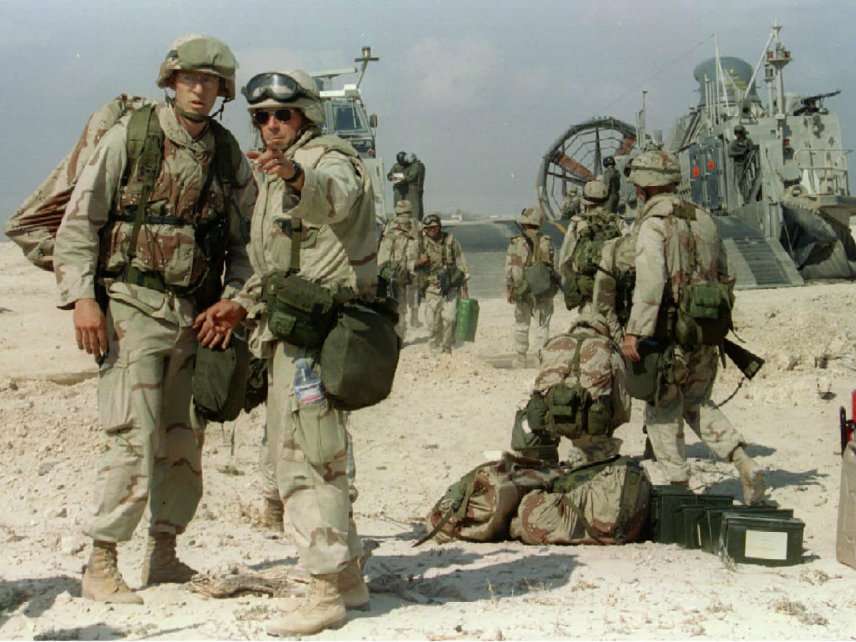If Trump Isn't Planning to Draw Down U.S. Intervention in Somalia, He Should Be
This is not a battle crucial to American security.

The United States has maintained some degree of military presence inside Somalia for much of the last three decades, but a pattern of escalation that began late in former President Barack Obama's second term has markedly accelerated in the two years since President Donald Trump took office. Airstrikes are on the rise; hundreds of U.S. boots are on the ground; and Trump's March 2017 decision to designate portions of Somalia as "areas of active hostility" means military operations can proceed with less oversight and greater tolerance for civilian casualties.
Somalia is thus, for all intents and purposes, another addition to Washington's roster of undeclared, undebated, and unnecessary wars of uncertain connection to U.S. security—and a Friday report from NBC News suggested Trump had finally come to see it that way. Citing multiple unnamed senior officials, NBC reported the administration would scale down the American military intervention in Somalia, "narrowing" the mission and shifting responsibility to local actors like the African Union and the Somali government.
"Not every nasty character out there is a threat to the U.S.," one official told NBC. "Do we want to do the Somali government's job for it?" A former counterterrorism advisor agreed, noting that Somalia's al-Shabab militants, the main target of U.S. intervention, are realistically "a parochial issue and not a direct threat to the United States." (These comments make key strategic distinctions too often overlooked in recent years of helter-skelter foreign policy: Not all bad guys are threats, and not all threats warrant a military response.)
By Monday, however, the Pentagon pushed back, denying any strategy shift. "There have been no recent policy changes regarding U.S. operations in Somalia," said a Defense Department statement. "We continue to support the Federal Government of Somalia's efforts to degrade al-Shabab."
Trump himself and other high-ranking security officials have yet to comment either way, which makes it difficult to decipher exactly what is going on here. On the one hand, it is possible NBC simply got it wrong. Perhaps the officials quoted were misinformed or working with outdated information. Perhaps they prematurely interpreted a hypothetical drawdown discussion to be a done deal.
That's certainly possible, but a more plausible scenario exists. Trump campaigned on avoiding and ending reckless wars of choice—for all his aggressive, "bomb the shit out of them" rhetoric, he also decried Washington's self-appointed role as "policeman of the world," pledging to "pursue a new foreign policy that finally learns from the mistakes of the past," one that would "stop looking to topple regimes and overthrow governments."
Trump's presidency, however, has generally continued the same interventionist policies of the last two administrations. His promises of peace, always inconsistent, have been smothered by the foreign policy establishment "blob."
But the last month has seem some glimmer of candidate Trump return: He announced a plan to withdraw U.S. troops from Syria, pledging American soldiers there would be home with their families soon. He reportedly ordered the Pentagon to make plans for withdrawing half of the 14,000 U.S. troops in Afghanistan. And on a surprise visit with U.S. forces in Iraq right after Christmas, Trump returned to his campaign-era talk of ending needless interventions. "The United States cannot continue to be the policeman of the world," he said. "We are spread out all over the world. We are in countries most people haven't even heard about. Frankly, it's ridiculous."
This impulse toward restraint, sadly, may be short-lived, as Trump's framing of the Syria plan has already shifted. He started speaking of a "slow" exit, after which National Security Advisor John Bolton announced the withdrawal would not happen at all absent an unlikely guarantee from Turkey. Meanwhile, other administration officials revealed that if any troops do leave Syria, many will simply be redeployed to neighboring Iraq, not sent home as Trump had pledged.
It is not hard to surmise what happened here: Trump wanted U.S. troops to leave Syria; Bolton and other reflexively pro-war members of his advisory team—as well as most of "permanent Washington"—did not. Trump made the initial announcement, but the subsequent implementation, handled by Bolton and his allies, has endangered, if not outright killed, the withdrawal plan. One could be excused for wondering exactly how much Trump controls his own administration's policy.
There is a lesson here about advisor selection, and there is also likely insight into what is happening with the administration's Somalia policy. The president and/or some portion of his team are ready to extricate the United States, having rightly recognized this is not a battle crucial to American security. But they seemingly have been forestalled by more interventionist elements in the White House—figures like Bolton, who in December gave a speech outlining a widespread, activist, military role for the U.S. in Africa.
That is unfortunate because the initial push to draw down U.S. military intervention in Somalia was the right one. If Trump isn't planning to draw down U.S. intervention in Somalia, he should be. Counter-terror in Somalia is a parochial issue which poses no existential threat to America, and there's no reason for Washington to do Mogadishu's job.


Show Comments (25)